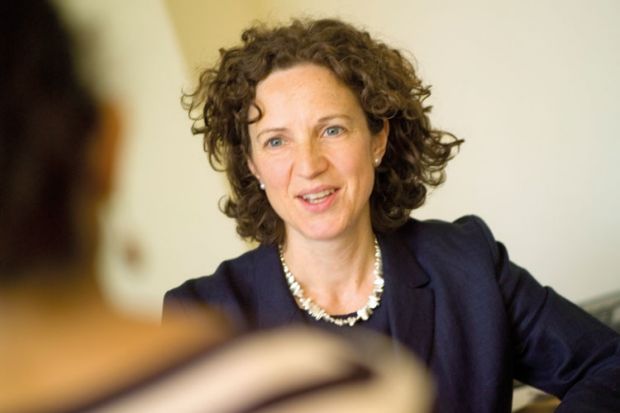Universities UK hopes student fees and university funding will not be election issues and warns that it will not support any Labour pledges for £6,000 fees or a graduate tax.
Looking ahead to sector priorities at next year’s general election, Nicola Dandridge, the UUK chief executive, also said the organisation wants political parties to agree to increase research spending. And stark messages from the Conservatives on cutting immigration would be “bad news” for universities, she said.
Ms Dandridge said UUK wanted three commitments from the political parties at the election: to cross-party consensus on government continuing to “co-invest” with students on the cost of teaching; to raising spending on research to match competitor nations; and to a plan to grow international student numbers.
Asked if UUK would like the political parties to commit to the £9,000 fees status quo, Ms Dandridge said: “I don’t think we’re going to be quite as specific as that.
“We will be asking for a commitment to public and private funding. In practice, it may end up looking like the current system in terms of the £9,000 cap.”
Nonetheless, Ms Dandridge said there should be “a general acknowledgement that the long-term funding needs to be put on a more sustainable footing”, highlighting the government’s rising estimates on the cost of the new loans system.
She continued: “I don’t think it’s particularly helpful if student fees and funding becomes an election issue. And I can’t imagine any of the parties would particularly want it to, but we’ll see how that pans out.”
On the view UUK might take of a Labour pledge to lower fees to £6,000 (the party’s current policy), she said: “I don’t think that would be helpful from the universities’ point of view. What we’re looking for is a degree of stability.”
On a graduate tax, also seen by Labour as a possible long-term goal, Ms Dandridge said: “Our policy position is one that’s not supportive of a graduate tax as a long-term solution.”
In terms of research spending, she said UUK would look to each party to explain how they would increase investment “to the level of our competitors, given that over the last spending review period there has been a real-terms cut of some 13 per cent”.
Sir Christopher Snowden, the UUK president, writes in Times Higher Education this week that a new government should explain how it would plan to “increase investment in research to a level commensurate with competitors, like Germany, over a 10-year period”. A multibillion pound rise from the UK’s current 1.8 per cent of GDP spent on research would be required to match Germany’s target of at least 3 per cent.
On internationalisation, Ms Dandridge said any government should aim to increase international student numbers, remove students from net migration targets and give postgraduate students in particular the right “to stay in the UK and work”.
At the Conservative conference last year, “immigration down” was trumpeted as a key achievement. Asked if such messages would be worrying if repeated at the election, Ms Dandridge said: “Yes, I think it would be bad news. Not just for universities but beyond that, for all the value that international students bring.”
Register to continue
Why register?
- Registration is free and only takes a moment
- Once registered, you can read 3 articles a month
- Sign up for our newsletter
Subscribe
Or subscribe for unlimited access to:
- Unlimited access to news, views, insights & reviews
- Digital editions
- Digital access to THE’s university and college rankings analysis
Already registered or a current subscriber? Login





